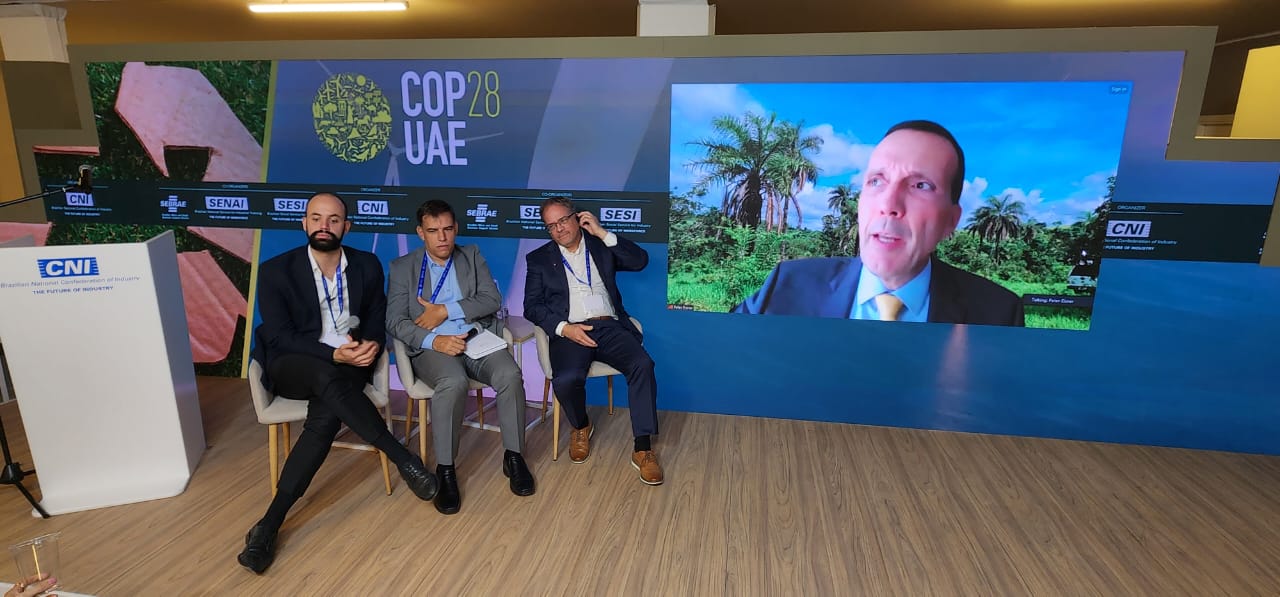Dubai, December 9, 2023 – A panel hosted by Acelen and the Fraunhofer Institute detailed the features affirming the net positive capability of macaúba. Panel participants included Peter Eisner, Deputy Director of the Fraunhofer Institute; Bernardo Estepha, Decarbonization and Sustainability Specialist at Acelen; Daniel Donne, Director of Carbon Asset Solutions; and Gustavo Goretti, MAPA General Coordinator of the Secretariat for Sustainable Development and Irrigation.
Bernardo opened the panel by emphasizing Brazil’s significant potential to lead the transition to green energy. He presented Acelen’s project, focusing on the production of renewable fuels, Sustainable Aviation Fuel (SAF), and Renewable Diesel from macaúba—a native Brazilian plant with high energy potential. Bernardo highlighted the project’s ability to reduce carbon emissions by up to 80%, providing the 4Fs: feed, food, fiber, and fuel. “We will export biofuel to the United States and Europe. Brazil will decarbonize the world while decarbonizing itself,” he stated. Bernardo also underscored the project’s social impact, generating 90,000 jobs, and its environmental aspects, including land restoration and the low water requirement for macaúba cultivation.
Estepha explained the origins of the Macaúba project and stressed the importance of “verticalizing” it from the beginning. He referenced research estimating the carbon credit market in Brazil as an $80 billion opportunity, asserting, “Brazil has everything to be a net exporter.” Echoing statements by Paul Polman, Estepha reinforced that Macaúba is a “net positive” raw material with entirely exploitable positive impacts.
Gustavo Goretti, representing the Ministry of Agriculture, focused on integrated crop-livestock-forest systems and ways to restore degraded soils by generating income for producer families. “Rural landscapes will be restored with forest and pasture walking hand in hand,” he declared.
Daniel Donne from Canada discussed carbon economics and explained the “MRV” system, where carbon emissions can be measured and quantified, enabling fair and standardized benchmarks. Donne listed the necessary methodologies to validate carbon dioxide measurements retained and emitted in plantations and praised Acelen’s 20-year commitment horizon, stating that it is the minimum for building a consistently regenerative performance.
Lastly, Professor Peter Eisner from the Fraunhofer Institute highlighted the versatility of Macaúba as a raw material serving various industries, not only producing energy but also foods and derivatives like bio-plastics. Eisner contextualized the global increase in demand for oil, emphasizing the need to meet this demand without deforestation, making Macaúba the ideal solution. “This is the future of agriculture,” Dr. Eisner exclaimed.
Dr. Eisner concluded by emphasizing that Macaúba is a solution respecting three pillars: social, economic, and environmental. He highlighted the ample space for value generation because macaúba can be used as fuel, feed, food, and fiber, becoming a rare zero-waste product aiding in regenerative agriculture. Additional differentiators for macaúba include its potential use on degraded lands, restoring soil health and carbon sequestration, and its cultivation in agroforestry and silvopastoral systems, without competing with food production.
